Go Global with Confidence: International SEO Ideal Practices
Go Global with Confidence: International SEO Ideal Practices
Blog Article
Browsing the Digital Landscape: Leveraging International SEO for Cross-Border Success
In today's interconnected digital world, organizations are increasingly looking beyond boundaries to touch into worldwide markets. The complexity of browsing the electronic landscape on a global range requires a nuanced method, from understanding the fundamentals of International SEO to implementing geotargeting and multilingual keyword strategies.
Comprehending International Search Engine Optimization Fundamentals
Navigating the complexities of international search engine optimization requires a strong understanding of essential concepts to efficiently expand on-line visibility across boundaries. One vital aspect of international SEO is recognizing the relevance of localization. This involves customizing internet site material to fit the etymological, cultural, and commercial differences of target markets. Key phrases should be not just equated but also adapted to mirror just how users in different regions search for information.
Additionally, having a clear understanding of geo-targeting is crucial. This involves indicating to search engines the particular nations or regions a web site is targeting. Executing hreflang tags is one means to communicate this info, ensuring that the correct variation of a page appears in the search results for an individual in a particular area.
Additionally, comprehending the influence of neighborhood internet search engine and social media systems is essential for global SEO success. While Google is leading in lots of areas, nations like China have their very own search engines like Baidu, needing tailored methods for each platform to make best use of online presence (International SEO).

Targeting Multilingual Search Phrase Strategies
Creating multilingual key phrase techniques is necessary for properly getting to diverse global target markets and maximizing online exposure across various etymological areas. When targeting multilingual key words methods, it is crucial to conduct complete research study to comprehend the details search terms and expressions utilized by the target market in each etymological region. This includes not only translating key words however also considering social subtleties, local languages, and search trends one-of-a-kind to every target market.
To develop an effective multilingual keyword phrase approach, it is necessary to focus on significance and search intent. Keywords need to straighten with the web content on the web site and reverberate with the social context of the target market. Making use of tools such as Google Key Words Coordinator, SEMrush, or Ahrefs can assist determine high-performing keyword phrases in various languages and assess their search quantity and competitors level.
Furthermore, surveillance and assessing the performance of multilingual search phrases frequently is essential for optimizing and fine-tuning the technique gradually. By constantly adjusting to changes in search actions and trends, companies can enhance their on-line visibility and draw in even more international traffic to their sites.
Implementing Geotargeting and Hreflang Tags
When intending to enhance worldwide SEO techniques, integrating geotargeting and hreflang tags is essential for optimizing website exposure throughout different areas. Geotargeting entails customizing content to particular locations, making certain that users in various locations obtain relevant details. By applying geotargeting, businesses can improve their neighborhood search positions and bring in region-specific website traffic.

Optimizing Internet Site Structure for Worldwide Visibility
To even more improve worldwide SEO approaches past geotargeting and hreflang tags, maximizing the site framework is necessary for attaining worldwide visibility and taking full advantage of reach throughout different regions. A well-structured website not only boosts customer experience however also promotes online search engine spiders in comprehending the web content and context of the site. When going for global exposure, it is important to make certain that the internet site is organized in a sensible way that deals with individuals from different countries. Applying a clear pecking order with distinctive classifications and subcategories can aid in enhancing the website's navigating and user-friendliness.
Furthermore, creating language-specific subdirectories or subdomains can check my reference aid search engines supply the appropriate variation of the internet site to individuals based upon their language preferences, even more improving the overall user experience. Furthermore, maximizing URL structures to include relevant Website keyword phrases and geotargeted terms can enhance the site's exposure in various regions. By structuring the site properly for global target markets, services can boost their chances of drawing in global traffic and broadening their reach throughout borders.

Monitoring and Assessing Cross-Border Efficiency
Efficient monitoring and analyzing of cross-border performance is necessary for examining the success of international search engine optimization approaches and recognizing opportunities for enhancement in worldwide reach and visibility. By carefully tracking essential efficiency signs (KPIs) across different markets, businesses can obtain important insights into the performance of their cross-border search engine optimization efforts. Checking metrics such as organic website traffic, keyword rankings, conversion rates, and bounce prices can give a thorough view of exactly how well an internet site is executing in various regions.
Assessing cross-border efficiency data enables businesses to identify fads, patterns, and locations for optimization. By comparing performance throughout various nations, areas, or languages, companies can pinpoint effective methods and center web content to better accommodate particular target audiences. In addition, keeping track of cross-border efficiency enables organizations to remain dexterous and receptive in the ever-evolving digital landscape. Routine evaluation of SEO performance on a worldwide scale guarantees that business can adapt their approaches promptly to take advantage of on arising chances and keep a competitive side in worldwide markets.
Conclusion
Finally, worldwide SEO plays a vital role in attaining cross-border success by enhancing sites for global visibility, targeting multilingual keyword approaches, executing geotargeting and hreflang tags, and monitoring cross-border efficiency. By recognizing the basics of worldwide SEO and enhancing site frameworks as necessary, businesses can properly get to and involve with other their target market across different areas and languages. This strategic strategy is crucial for increasing market reach and driving online growth in today's digital landscape.
Report this page